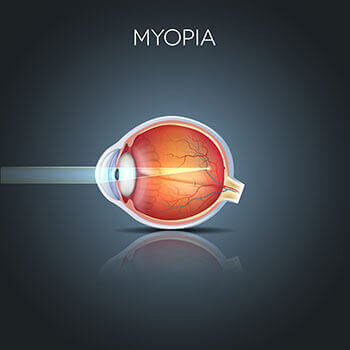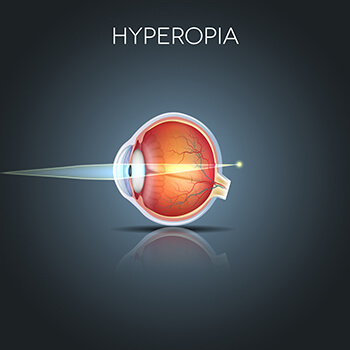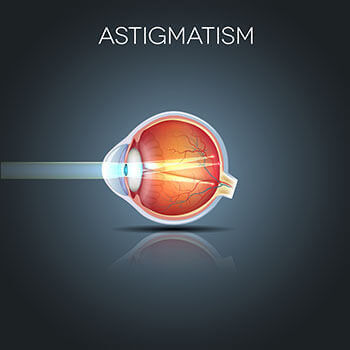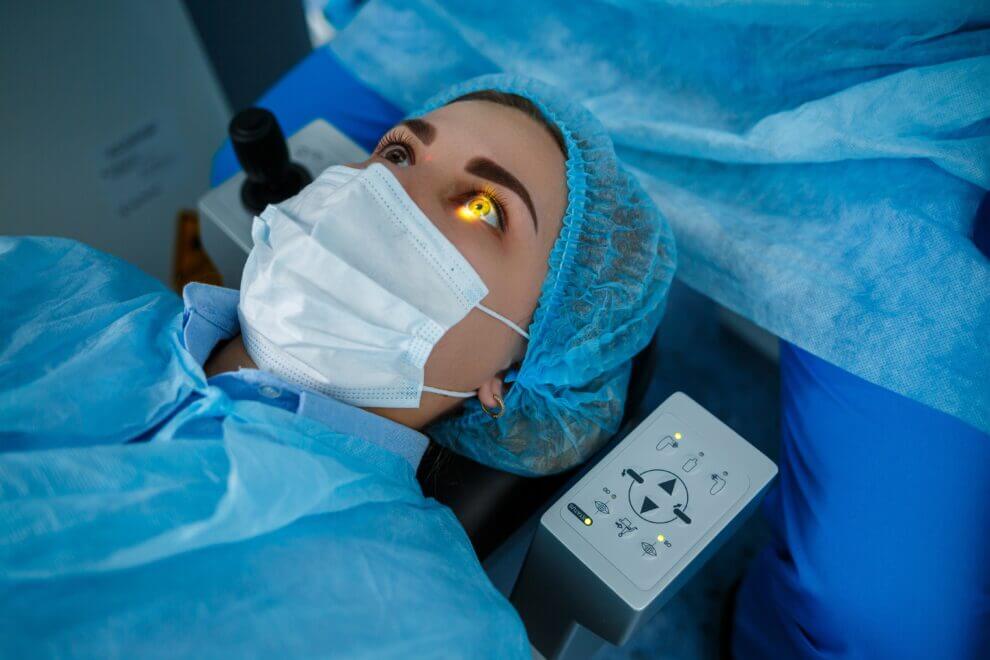LASIK (Laser-Assisted In Situ Keratomileusis) is one of the most popular and well-known procedures for correcting myopia (nearsightedness), hyperopia (farsightedness) and astigmatism. During this blade-free procedure, a laser gently reshapes the cornea – the clear window in front of the eye – to improve your vision and reduce your dependence on glasses and contacts.

In order to qualify for LASIK, patients must meet the following basic requirements:
If you meet the above guidelines, we invite you to come to our office for an evaluation with Dr. Nightingale to determine if you are a strong candidate for LASIK.

When the eye is too long or the cornea is too steep, light entering the eye cannot be focused correctly (focuses before the retina) which causes distant objects to appear blurry.

When the eye is too short, light entering the eye cannot be focused on the retina (focuses past the retina) which causes intermediate and near objects to appear blurry.

When the cornea is irregularly shaped, light entering the eye cannot be focused sharply on the retina which causes blurred vision at all distances.
Dr. Nightingale and our staff will conduct a detailed analysis of your vision and eye health to determine if you are a strong candidate for LASIK. The evaluation will include the following:
After consideration of this extensive evaluation, Dr. Nightingale will be able to determine if you are a strong candidate for LASIK. In the event you are not a strong candidate for LASIK, Dr. Nightingale can determine whether you are a suitable candidate for other vision correction procedures like PRK or Refractive Lens Exchange. Vision correction surgery is not suitable for many patients and Dr. Nightingale will also inform you if you are not a good candidate for any vision correction procedure.
Proper preparation helps ensure optimal results from your LASIK procedure at Nightingale Eye Associates. Before your surgery day, you’ll need to arrange for someone to drive you to and from your LASIK procedure since you won’t be able to drive immediately afterward.
We recommend scheduling at least one day off work, though many patients feel comfortable returning to office work the next day. It’s helpful to fill any prescription eye drops in advance and prepare comfortable meals ahead of time to enjoy during recovery.
Many patients find it relaxing to download audiobooks, podcasts, or music for the initial recovery period when you’ll want to rest your eyes.

On the day of your LASIK procedure, your eyes will be numbed with anesthetic eye drops and you will be given a sedative medication (Valium) to help you relax. Dr. Nightingale will review the LASIK treatment plan with you.
After the reshaping of your cornea is complete, the corneal flap is gently returned to its original position where it self-seals. You will be brought to a room to relax and Dr. Nightingale will review some post-operative instructions with you.
At Nightingale Eye Associates, our LASIK patients enjoy numerous life-changing benefits, including:
LASIK provides crisp, clear vision without the hassle of glasses or contacts. Imagine waking up and immediately seeing your alarm clock, enjoying outdoor activities without foggy glasses, or swimming without worrying about contacts!
Many patients achieve better vision with LASIK than they ever had with glasses or contacts. The procedure delivers customized correction for your specific refractive errors, often resulting in enhanced depth perception and field of vision, which is perfect for sports, hobbies, and navigating daily life confidently.
The LASIK procedure at Nightingale Eye Associates typically takes less than 30 minutes and is virtually painless thanks to anesthetic eye drops. Most patients return to work and driving within just one day, making it ideal for busy professionals and active individuals who can’t afford extended downtime.
While LASIK requires an initial investment, most patients save money over time. The average glasses or contact lens wearer spends approximately $500 annually on prescriptions, replacements, cleaning solutions, and repairs. Our flexible payment options help make LASIK an affordable long-term solution for clear vision without recurring costs.
While LASIK is considered safe and effective with a high satisfaction rate, as with any surgical procedure, there are potential risks and side effects. Most patients experience some temporary side effects, including dry eyes, for several weeks to months after the procedure.
Some people notice glare, halos, or starbursts around lights, especially at night, though these typically diminish over time. Mild discomfort or irritation during the first 24-48 hours is normal, as is sensitivity to light and blurry or fluctuating vision during the initial healing process. Less common risks include undercorrection or overcorrection, which may sometimes require enhancement procedures. Some patients develop dry eye syndrome that persists beyond normal healing, though this can typically be managed with treatment. Infection is extremely rare with modern LASIK techniques, and our stringent protocols at Nightingale Eye Associates further minimize this risk. In rare instances, patients may experience vision irregularities that cannot be fully corrected with glasses.
At Nightingale Eye Associates, we thoroughly evaluate every patient to minimize these risks. We use advanced diagnostic technology to create detailed maps of your eyes and determine if you’re an ideal candidate for LASIK. During your consultation, we’ll discuss your specific risk factors based on your eye health, prescription, and other factors to ensure you’re fully informed before proceeding with surgery.
LASIK recovery is typically quick and comfortable. You’ll use prescription eye drops according to our specific schedule to prevent infection and reduce inflammation. We provide protective eye shields to wear while sleeping to prevent accidental rubbing, which could disrupt the healing corneal flap. During this time, it’s important to avoid getting water, soap, or shampoo in your eyes.
You’ll attend your follow-up appointment during the first week, typically scheduled for the day after surgery. Most patients return to work and driving within 24-48 hours, though we recommend avoiding strenuous exercise, swimming, hot tubs, and dusty environments for about a week. You’ll continue using prescribed eye drops according to our instructions to support the healing process. Following all post-operative instructions and attending scheduled follow-up appointments are essential for optimal healing.
Conventional LASIK involves using the standard method of measuring a patient’s glasses prescription as the input to the laser. Dr. Nightingale carefully determines your optimal glasses during your LASIK evaluation visit in order to determine the best LASIK correction.
Custom LASIK uses a special measurement device and computer to create a map of all the subtle imperfections of a patient’s vision. This is called a “Wavefront Map” and it is unique to each patient, much like a fingerprint. Custom LASIK utilizes these highly precise measurements, in addition to a patient’s glasses prescription, in order to form a patient-specific treatment profile. Dr. Nightingale prefers custom treatment to conventional. We utilize the iDesign suite and Star S4 excimer laser by Johnson & Johnson for our treatments.
Dr. Nightingale has received extensive training as a refractive surgeon at some of the most renowned institutions in the world. He has treated thousands of patients to achieve superior refractive surgery outcomes. He has a deep commitment in achieving the best outcomes and he will be directly involved in your care starting from your preoperative evaluation.
We’re excited to announce that Nightingale Eye Associates will be moving to a new office near Columbus Circle.
Our new location beginning December 22, 2025:
1776 Broadway, Suite 1410
New York, NY 10019
(at Broadway & West 57th)
Please note: Only our location is changing.
All our contact information remains the same.
Phone (212) 877-7188 | Text (917) 636-4153 | Fax (212) 877-3912 Email [email protected]